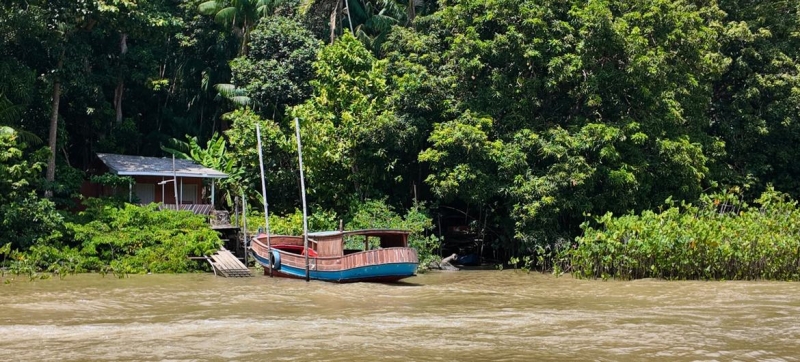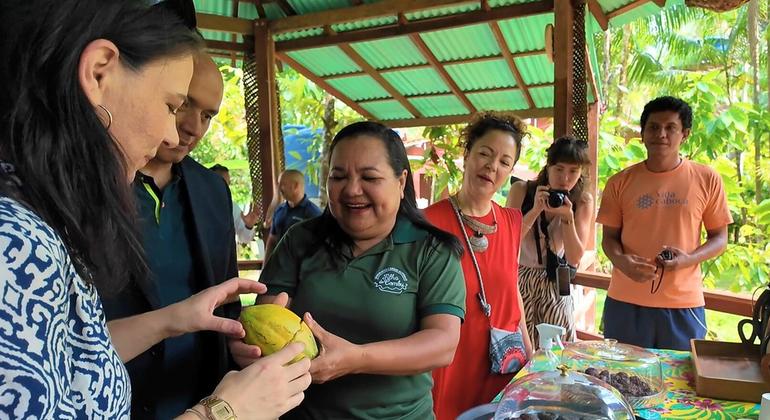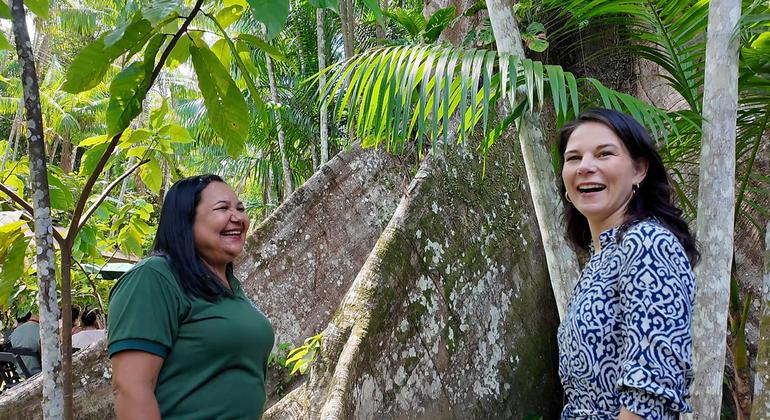
Combu Island, Brazil. “Kombu’s Daughter”: how one woman changed the life of an entire island Felipe de Carvalho, Belem Climate and Environment
Combu Island rises like a green wall over the Guam River in Brazil. Local communities have lived in harmony with nature for centuries. Here, cupuaçu, tapereba, pupunya, araza and cocoa are not just fruits. They are inextricably linked to local identity, culture and economy.
But today Kombu’s natural wealth is in danger. To protect the world’s forests, we must first support those who preserve them, the UN emphasizes.
Chocolate in harmony with nature
Kombu is just 30 minutes by boat from Belém, the “gateway to the Amazon,” the city currently hosting the UN Climate Conference (COP 30). The association “Daughter of Combu” (Filha do Combu), created by the entrepreneur Izete Costa, better known as Dona Nena, operates here. Her project proves that community-led movements can influence global action on climate change.
What began as a humble attempt to turn tradition into a source of income has grown into a thriving enterprise. Dona Nena started by making chocolate from Amazonian cocoa and selling at local fairs, and then received professional training to expand the business.

Today she runs a small factory and a tourism program where participants can see how chocolate is made in the rainforest. Of the 20 employees, 16 are women.
Production is based on the principles of agroecology. In particular, only local plants are used.
“I try to enrich the forest with what grows well,” says Dona Nena. “We don’t cut down forests to plant something.” We work with the existing forest and plant trees where there is natural decline.”
Solar Energy and Future Plans
The factory, whose products are sold throughout Brazil, runs eight hours a day on solar power. One of the main problems is power outages. When trees fall and transmission lines are damaged, machines are idle for days. Dona Nena hopes to double solar capacity to ensure production stability.
In addition to grid problems, Kombu is feeling the effects of climate change. Cocoa yields are declining, fruits and trees are drying up and becoming deformed. In addition, the island began to have problems with drinking water: despite the beginning of the rainy season, there has been no rain on Kombu for more than 15 days.
Local solutions with global impact
Last Sunday, Annalena Burbock, President of the UN General Assembly, visited Kombu for the second time – the first time she met Dona Nenay was still Germany’s foreign minister.
“I am pleased to see the project flourishing and creating value chains in the heart of regional communities – with benefits for indigenous peoples and local people,” Baerbock told UN News Service.

According to her, the initiative proves that real solutions already exist. They combine economic growth, sustainable development and combating the climate crisis. Scaling up such models is necessary to keep global temperature rise within two, ideally one and a half, degrees Celsius.
“The destruction of forests is the destruction of humanity’s safety net,” warned Burbock.
“COP30 must show the world that even in geopolitically challenging times, countries, businesses and financial institutions come together to fight the climate crisis and deliver sustainable growth for all,” she added.
Lessons forests
After tasting Amazonian fruits and local chocolates, Dona Nena led Burbok along the forest trail where two years ago they met women who produce cocoa.
They discussed how the project is helping to empower local women economically. Dona Nena emphasized that women bring a special energy of care and devotion, which is reflected in the quality of chocolate. What kind of future do they have? “When the tree dies, the vine will also die, losing its source of nutrition,” Dona Nena explained. Burbock noted that this is a “hidden lesson” that reminds us of global emissions that are destroying the planet.
But the forest also brings hope. They stopped in front of a sumauma, an Amazonian giant that is over 280 years old. These trees, from the baobab family, could see centuries to come – if COP30 participants achieve the necessary results.
